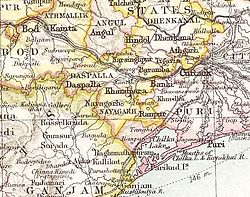Khandpara State
| Khandpara State ଖଣ୍ଡପଡ଼ା |
|||||
| Princely State of British India | |||||
|
|||||
|
Flag |
|||||
| Khandpara State in the Imperial Gazetteer of India | |||||
| History | |||||
| • | Established | c. 1599 | |||
| • | Accession to the Union of India | 1948 | |||
| Area | |||||
| • | 1901 | 632 km2(244 sq mi) | |||
| Population | |||||
| • | 1901 | 77,929 | |||
| Density | 123.3 /km2 (319.4 /sq mi) | ||||
Flag
Khandpara State (Odia: ଖଣ୍ଡପଡ଼ା) was one of the princely states of India during the period of the British Raj. It was located in present-day Nayagarh district, Odisha.
The state was bounded in the north by the Mahanadi River. The main town was Kantilo, but the capital was at Khandpara (Khandapada).
Khandpara State was initially part of Nayagarh State, founded by a former ruler of Rewa State, but became a separate kingdom in 1599 when Jadunath Singh Mangraj, the first ruler of Khandpara received the title of 'Mangraj' from the Maharaja of Orissa. The rulers were Rajputs of the Baghela or Vaghela dynasty. The last Raja of Khandpara signed the instrument of accession to the Indian Union on 1 January 1948.
The rulers of Khandpara State bore the title of Raja. The emblem of the Khandpara royal family was the head of a tiger; state symbols were identical in neighboring Nayagarh State.
Coordinates: 20°15′50″N 85°12′51″E / 20.26389°N 85.21417°E
...
Wikipedia


